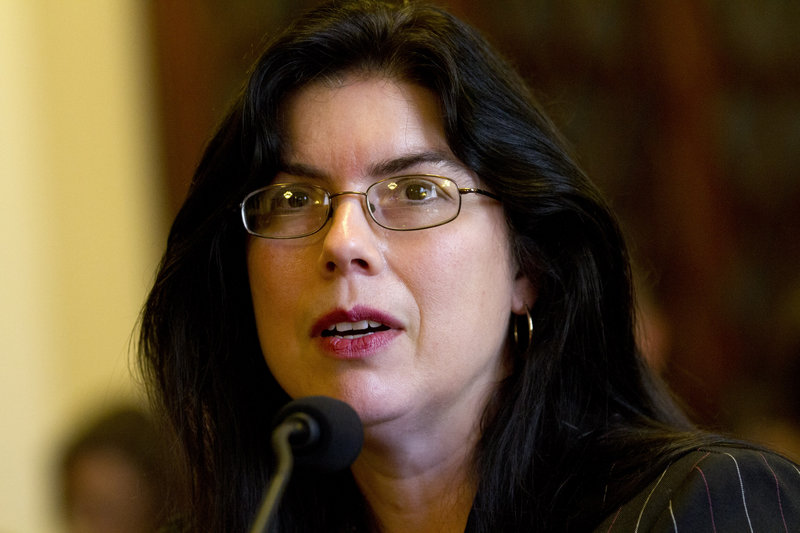WASHINGTON — The Senate on Tuesday began debating a broad veterans’ benefits bill that would expand health care and education services for former military personnel but that some Republicans warned could overburden programs already struggling to meet demand.
The Democrat-sponsored bill would allow more uninsured veterans to receive health coverage through the Department of Veterans Affairs and would expand dental coverage. It would also allow veterans to qualify for in-state tuition at public colleges in whichever state they are living and cover the costs of fertility treatment for veterans made infertile because of service-related injuries.
The legislation also includes a provision – named for Maine veteran Ruth Moore – that would make it easier for veterans who were sexually assaulted while serving in the military to qualify for disability benefits.
“This bill is big and broad because the needs of all of our veterans are big and broad,” said Sen. Richard Blumenthal, D-Conn., told a committee room packed with veterans earlier Tuesday.
Veterans groups overwhelmingly support the measure, which cleared an initial vote on Tuesday. But hundreds of veterans converged on Capitol Hill on Tuesday to also demand that Congress take action on another measure not included in the Senate bill.
Under current law, the VA is required to fund most mandatory programs – including all health care programs – at least one year in advance. But pre-funding is not required for many administrative and discretionary programs. As a result, VA personnel who help veterans with disability claims were furloughed during the 17-day government shutdown in October and the VA came within 10 days of being unable to send out disability and pension checks.
During a snowy news conference outside of the Capitol, representatives of the Disabled American Veterans, the American Legion, Veterans of Foreign Wars and the Iraq and Afghanistan Veterans of America called on congressional leaders to “keep the promise” by allowing a House vote on a bill to pre-fund VA discretionary programs.
“We saw what happened with the shutdown and hopefully we will be able to get it to the floor this year,” said 2nd District Rep. Mike Michaud of Maine, the top-ranking Democrat on the House Veterans’ Affairs Committee and co-sponsor of the House bill with the committee’s chairman, Rep. Jeff Miller, R-Fla.
The Senate, meanwhile, voted 99-0 Tuesday afternoon to move forward with additional debate on the omnibus bill, sponsored by Sen. Bernie Sanders, the Vermont independent. But despite the lopsided vote, the bill likely faces political hurdles in the coming days as Republicans attempt to whittle down the measure’s estimated $21 billion price tag and force votes on issues unrelated to the measure.
Sen. Richard Burr of North Carolina, who is the top Republican on the Senate Committee on Veterans’ Affairs, said the VA already struggles to provide health care and other services to veterans. Burr opposed expanding programs to new populations – especially to veterans without a service-connected disability or who are not low-income – without first researching how the changes could affect existing services.
“Once we reform (VA programs), we can talk about expansion,” said Burr, who has offered a slimmed-down veterans bill. “Until then, it is irresponsible for this Congress and for this Senate to talk about dumping more people into an already broken system.”
Republicans also plan to push for votes on amendments unrelated to the veterans bill. One such issue is a proposal – included in Burr’s alternative bill – to impose additional economic sanctions on Iran unless that country upholds its end of an interim agreement aimed at halting its push to develop nuclear weapons.
“Why? Because it’s the only way to get this to the floor and because we are denied any other way to do it,” Burr said, alluding to Senate Majority Leader Harry Reid’s decision not to allow votes on the issue to date.
Sanders, who chairs the Senate Committee on Veterans’ Affairs, urged his fellow senators to avoid bogging down the veterans’ bill by attempting to force votes on Iran and other unrelated issues.
“We have made progress [on veterans’ issues] but we still have a long way to go and I hope very much that we will go down that road together,” Sanders said.
The Sanders bill would make several changes to how the military handles sexual assault claims. One of those changes is named for Ruth Moore, a resident of Milbridge, Maine, who has become a national spokeswoman for removing barriers for veterans to receive disability compensation for physical and emotional injuries tied to sexual assault.
The bill would make it easier for veterans to receive compensation exams or review for disability claims for post-traumatic stress disorder tied to sexual assaults that occurred during their military service. The bill would also expand counseling and treatment to members of the National Guard and Reserve who are assaulted during inactive duty training.
With the help of Rep. Chellie Pingree, a Democrat who represents Maine’s 1st District, Moore testified in Congress about her more than two-decade-long fight with the VA to receive treatment and disability compensation for sexual attacks she suffered as a young Navy enlistee.
The House passed Pingree’s version of the Ruth Moore Act last year but the Senate has not taken action on that bill.
Kevin Miller can be contacted at 317-6256 or at:
kmiller@pressherald.com
Twitter: @KevinMillerDC
Send questions/comments to the editors.




Success. Please wait for the page to reload. If the page does not reload within 5 seconds, please refresh the page.
Enter your email and password to access comments.
Hi, to comment on stories you must . This profile is in addition to your subscription and website login.
Already have a commenting profile? .
Invalid username/password.
Please check your email to confirm and complete your registration.
Only subscribers are eligible to post comments. Please subscribe or login first for digital access. Here’s why.
Use the form below to reset your password. When you've submitted your account email, we will send an email with a reset code.